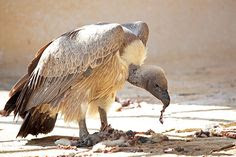.Amazing Facts About Vultures.
.Vultures are one of the most scariest bird we all know. It is a carnivorous but most of them are feed themselves by dead animals. Vultures are big in size and they are found in almost all countries in the world.
Today in this article we are going know some amazing facts of Vultures and also going to know that why in last 10 or 13 years we lost 70% of Vultures population.
.Why Vultures Are In News?
 |
| Vultures. |
- The number of Gyps Vultures in Gujarat has plummeted, Union minister of state, ministry of environment,forest and climate change (M.O.E.F & C.C), Babul supriyo told the lok sabha in a written reply.
- The most recent Vulture population estimation in Gujarat was carried out in early June 2018.
- A decline of 75.8 per cent in the G.Y.P.S Vulture population was recorded in the state between 2005 and 2018.
- The decrease was marked in most major districts of the state.
- Ahamedabad area recorded an 80 percent decrease in Vulture population from 2005 with number falling from 2005 with number falling from 254 to 50 in 2018.
- I.I.M Ahamedabad, one of the biggest Vulture colonies in the state, does not have a single Vulture remaining, thanks to development work within the campus.
- 2016 census-999 Vultures in the state.
- 2018 census-820 Vultures remained
- thus, between 2016 and 2018, the number declined by 18%
- The problem of declining Vulture population is not just a problem for Gujarat.
- The vulture population in India has declined by a shocking 99.95 per cent since the 1980.
- 40 million in 1970.
- 19,000 in 2015.Which Survey Was This ?
Which Survey Was This ?
 |
| Vulture. |
- The forest department of Gujarat in collaboration with the Gujarat Ecological and research foundation has been monitoring the population since 2005.
- Natural-wild Vulture surveys are carried out by Bombay natural history society every four year, sponsored by the M.O.E.F %C C and the forest departments of various states since 1990.
- Vultures, like tigers, are highly mobile, and therefore, left-behind nests can lead to incorrect estimation of the bird population.
- There are challanges of replication of data in all surveys provide the best measure so we await results from that for a better understanding.
- The survey are carried out mainly for three species of critically endangered resident Gyps Vultures, white-backed Vulture, long-billed Vulture and slender-billed Vulture.
Based on the latest survey carried out 2015 and the result published in 2017, there where about.
- 6,000 white-backed Vultures and
- 1,000 slender-billed Vultures,
Why Are Vulture Declining?
 |
| Vulture. |
- Vulture have been facing a serious problem with 'diclofenac' contamination in animal carcasses, which forms the basis of their sustenance.
- Widespread use of the live stocks drug 'diclofenac' has been known to be one of the major factors affecting Vultures population in India.
- The drug, used as an anti-inflammatory and analgesic in cattle, is lethal to Vultures when they feed on carcasses of livestock which received diclofenac before death.
- Death due to formation of visceral gout and renal failure has been associated with diclofenac is banned by the drugs and cosmetic Act of the government of India.
- Meloxicam-substitute.
- New drugs like nimesulide and ketoprofen are also causing deaths.
- lack of open spaces.
- Increasing number of high rise buildings.
What Has The Govt Done To Protect Vultures?
- The protection status of white-backed, long-billed and slender -billed Vultures was upgraded from schedule 4 to 1 of the wild life (protection) Act, 1972.
- Diclofenac was banned in 2006.
- To conserve the remaining population of Vulture in the country and also to facilitate the reintroduction of Vultures into the wild form Vulture conservation breeding Centres (V.C.B.S), attempts to create Vulture safe zone in the area are being made.
.Eight identified Vultures safe zone in the country are being made including.
 |
| Vulture. |
- Pinjore in Haryana.
- Rajabhatkhawa in West Bengsl,
- Majuli island in Assam,
- Bukswaha in Bundelkhand, Madhya Pradesh,
- Dudhwa National Park,
- Katerniaghat wild life century in Utter Pradesh,
- Hazaribagh in Jarkhand ,
- Central Gujarat and Saurashtra in Gujarat.
Thank you.
If you like my content then read my other article also panda.





0 Comments:
Post a Comment